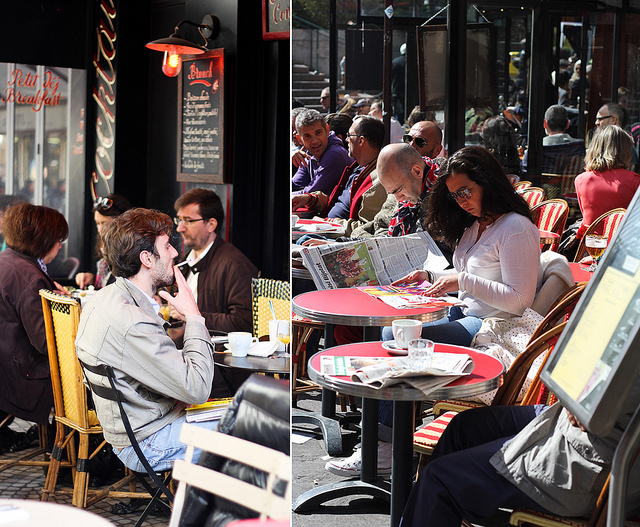Five weeks vacation, recurring cigarette-espresso breaks and two hour lunches are among the stereotypes perpetuated about French work culture and I can say from experience, only two of three are still true today. Lingering over glasses of wine and copious lunch plates for two hours is a habit rapidly slipping from convention as is the notion that the French are unproductive.
It occurred to me recently that my career actually began in France. I worked retail in the States throughout college but nothing full-time and nothing I intended to make a lifelong vocation. That said, my reference is slanted and I base much of my understanding of American work-culture on what I remember and what my close friends and family describe. My professional experiences in Paris have all been part of an international context and so I’ve been exposed to the work styles and ethics of individuals from all over the world. This also means that my observations about French work culture reflect a very specific sector – advertising/comm/web (where business suits raise eyebrows) – but are likely applicable to other global industries.
When I first set out to do a post about work culture, I used my husband’s environment as a comparison – a traditional French company with approximately 11,000 employees and part of a massive French conglomerate. But I also wanted a couple of other expats who have worked in France longer than I have to include some of their insights as well.
| BASICS
- Vacation: reserving time for travel and personal time is as entrenched in French culture as those extended lunches that once helped define the workday. Vacation time begins at 5 weeks but can reach anywhere from 10-12 weeks depending on RTT days (paid days off resulting from the reduction in statutory weekly working hours from 39 to 35 hours). My husband has colleagues who have saved an entire year’s worth of vacation to take it the following year in one go. Can you imagine a U.S. company allowing someone to take an entire month off, even if it is owed to them? This does not, however, mean that the French are unproductive. They simply understand that to remain productive they need time to relax and recharge. They’re also not the only Europeans with generous holidays – Germans, Danes and Italians average more off days than the French.
- Subsidized lunches: companies that do not have an on-site cafeteria generally offer partially subsidized meal vouchers (tickets restaurants or ‘tickets resto”) worth between 6.50-10€. Meals in company cafeterias are also inexpensive and quite varied. The shift to eating-on-the-go (or eating-behind-screen, as it were) is increasingly prevalent where meal vouchers are provided.
- Health Insurance: I have French healthcare (sécurité sociale) but most large companies require employees to take supplementary coverage called a mutuelle. The fees per month vary but can range anywhere from 20-30€ depending on the plan and amount of coverage you choose. I love having an engineer for a husband because he amused himself creating an excel chart to track our medical expenses. Given my endless series of doctors visits and personal pharmacy of medications to treat my back, having that coverage was invaluable. We definitely recovered our investment.
- Transportation Coverage: most companies will cover half the price of a monthly metro/bus pass. Given the amount I use public transportation – anywhere between 3-6 times a day – this gesture is significant.
Katia, an Australian expat in Paris, has worked with the French for ten years and is still struck by how seriously employee rights are taken. She says, “when it comes to knowing their rights, the French are far more conscious. She says, “whether it’s working hours and holidays or the type of of task an employer is legally allowed to ask you to do. I still find it fascinating to witness the automatic reflex of “let’s look up the code du travail or the convention collective” whenever there is any kind of discussion about “rights”.
| ETHNOGRAPHIC OBSERVATIONS
- Hierarchy : even in increasingly relaxed and informal professional settings, adhering to hierarchy is paramount. One of the ladies from La Mom remarked that there is no open-door policy unlike at the American companies where she previously worked.
- Openness: I’m always surprised by how much personal information is shared among colleagues during work hours. Illnesses, family matters, money troubles, work complaints – dirty laundry is aired freely both in and out of the office. Unlike the uber-American cubicle, open-space setups help to facilitate these sorts of discussions. Similarly, post-work apéros and dinners are as common and frequent as lunching together during the day – decline too many offers and you’ll find yourself branded the outcast for lack of integration. The separation between professional and personal life, at least in my current experience, appears blurred. While I find it refreshing to see so many strong bonds, I also sense the danger in such candidness. (Note: this is very true for my company + industry. French colleagues are far more reserved in more traditional settings.)
- Cigarettes and coffee… motivate breaks almost every hour. In most cases, business is discussed between puffs and sips but you can always tell when a meeting has run too long by the frantic tapping of cigarette packs on the table. Work hours are growing longer and longer in many industries which begs the question – is there more work or is it to compensate for all the breaks? Likely a mix of the two.
- Politically incorrect: crude jokes, sexual innuendos, culture bashing and general inappropriateness have, at one time or another, shocked the puritan sensibilities of many Anglo-saxons. I like to tease my colleagues by reminding them how many lawsuits they’d likely have against them if we were in America to which they giggle riotously. Though I’m still not impervious to their blows, living in France has shown me how unnecessarily uptight most of us (Americans) are, with a tendency to conflate innocent joking with harassment. Of course there are exceptions to this and I’ve seen the French take things too far. La Mom recalls having her American accent ridiculed in an interview – more than just un-PC, it’s plain unprofessional.
What I found most interesting after talking with Katia and La Mom was just how different their insights were from mine, likely a result of industry and tradition. How does this differ from your experience?











